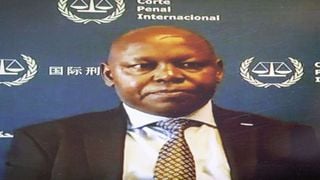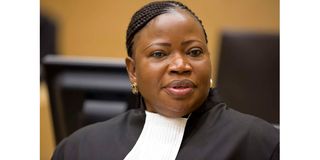
Kenyan lawyer Paul Gicheru when he made his first appearance before the ICC on November 6, 2020, before Judge Reine Adélaïde Sophie Alapini-Gansou of Pre-Trial Chamber A.
| Pool | AFPNews
Premium
ICC witness tampering: It’s Paul Gicheru vs witnesses
Allegations of meetings and cash payments are at the centre of the International Criminal Court (ICC) prosecutor Fatou Bensouda’s case against Kenyan lawyer Paul Gicheru.
But the case will likely come down to prosecution witnesses’ word against Mr Gicheru’s. This is because, according to the document, the prosecution evidence largely relies on what witnesses — some whose credibility has been previously questioned — told the investigators.

ICC Prosecutor Fatou Bensouda.
Moreover, as the prosecution’s evidence shows, the alleged payments were made in cash, which could deprive Ms Bensouda’s team of transactional details that could be linked to Mr Gicheru. Some witnesses, however, deposited the monies they allegedly received in their bank accounts and provided the prosecution with bank statements.
According to the document containing charges and the list of evidence published on Friday, the prosecution alleges that Mr Gicheru held several meetings in Eldoret, Nakuru as well as in Nairobi, among other places.
The prosecution alleges that Mr Gicheru used his office in Veecam House, Eldoret “as an operations centre” to direct activities of intermediaries and corrupted witnesses to advance the aims of the common plan to scuttle the crimes-against-humanity case against Deputy President William Ruto.
At the Veecam House office, the prosecution says, meetings took place with prosecution witnesses to negotiate or pay bribes in exchange of the witnesses agreeing to cease cooperation with the ICC prosecution.
There also allegations of certain intermediaries travelling to neighbouring countries. In the warrant of arrest against Walter Barasa, who is alleged to have been part of the plan to corruptly influence witnesses, for instance, the prosecution stated that he had travelled to Kampala on a number of occasions to meet protected prosecution witnesses.
“Gicheru made an essential contribution to the Common Plan through... meeting in person with certain prosecution witnesses and negotiating and/or paying bribes in exchange for their withdrawing as witnesses, ceasing cooperation with the prosecution and/or the Court, and/or recanting their evidence, and threatening them with adverse consequences if they failed to comply,” says Ms Bensouda in her case against the Kenyan lawyer.

Kenyan lawyer Paul Gicheru when he made his first appearance before the ICC on November 6, 2020, before Judge Reine Adélaïde Sophie Alapini-Gansou of Pre-Trial Chamber A.
The eight witnesses who Mr Gicheru is accused of corruptly influencing also talk of millions of shillings being given to them to cease cooperation with the ICC or to facilitate their approaches to other witnesses.
The defence has already indicated to the pre-trial chamber that it will not be filing its list of evidence since “the prosecution bears the burden... of proving each charge with sufficient evidence”.
“The defence does not intend to ‘present evidence’ within the meaning of Article 61(6)(c) and Rule 121(5) and intends to rely on evidence presented by the prosecution in its List of Evidence and other evidence disclosed by the prosecution,” Mr Gicheru’s lawyer Michael G Karnavas informed the pre-trial chamber on April 8.
“No hearing is being accorded and no witnesses are being called in this truncated confirmation of charges process. Having disclosed the evidence to the defence, the prosecution has had ample opportunity to prepare for any defence reliance on that evidence,” the lawyer added in the notification to the pre-trial chamber.
But, in a quick rejoinder, the prosecution is asking the pre-trial chamber to order the defence to file its list of evidence.
“The Prosecution submits that a proper reading of the Chamber’s order reveals that, while the disclosure of evidence by the defence is optional, the filing of the list of evidence is not,” Ms Bensouda says.
In Mr Gicheru’s defence, the trial chamber judgment that terminated the post-election violence case against Dr Ruto and journalist Joshua Sang will likely come in handy, as the judges had raised questions about the credibility of the witnesses.
All the eight witnesses whose statements the prosecution is relying on are people who have shifted allegiance: most started as prosecution witnesses or were initially collaborating with the prosecution and then at some point jumped out, allegedly after being induced by the cash payments. Later on, they returned to the prosecution when they reportedly felt unsafe.
In-court testimonies
In the judgment, Judge Robert Fremr had found witness P-800, for instance, “has demonstrated a willingness to lie in return for personal gain and induce others to lie as well, apparently without concern for the significant implications of such dishonesty.”
Witnesses P-516 and P-0495 were both forced by the ICC to testify and, in their in-court testimonies, they recanted everything they had previously told the prosecution. They later returned to co-operate with the prosecution.
In the filing of the evidence, Ms Bensouda pleads with the pre-trial chamber to “take great care in reaching a finding that a witness is or is not credible.”
“Furthermore, the Chamber should not reject evidence solely for lack of corroboration, since a reasonable trier of fact may reach findings based on uncorroborated evidence. Nor should the mere presence of inaccuracies or inconsistencies automatically render a witness’s evidence unreliable in its entirety,” the prosecution states.
The prosecution also asks the pre-trial chamber to adopt “a particularly nuanced approach to the assessment of credibility, since cases such as the present will almost inevitably involve witnesses whose evidence has been perverted through the operation of the corrupt influence brought to bear on them by the very persons accused of the offences.”





